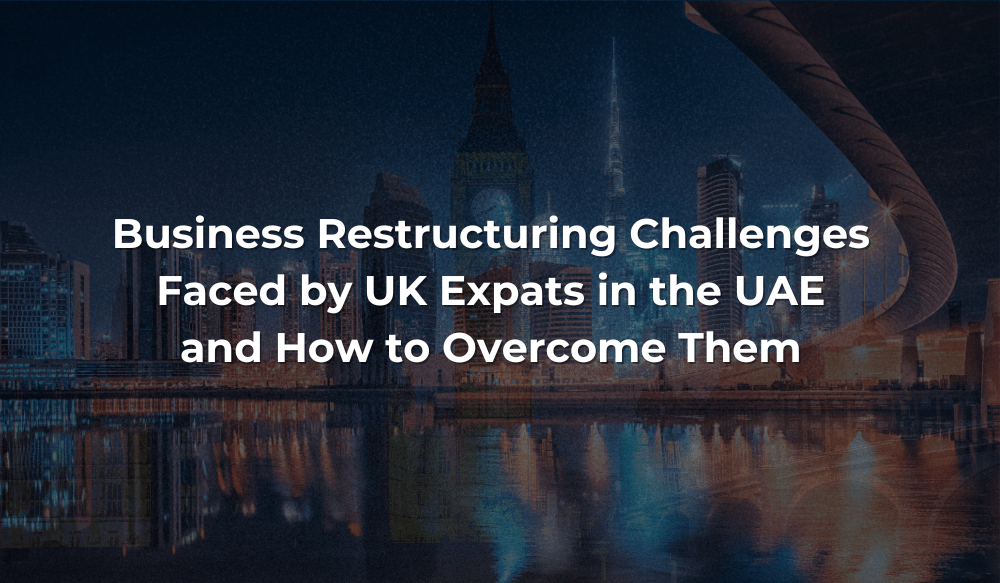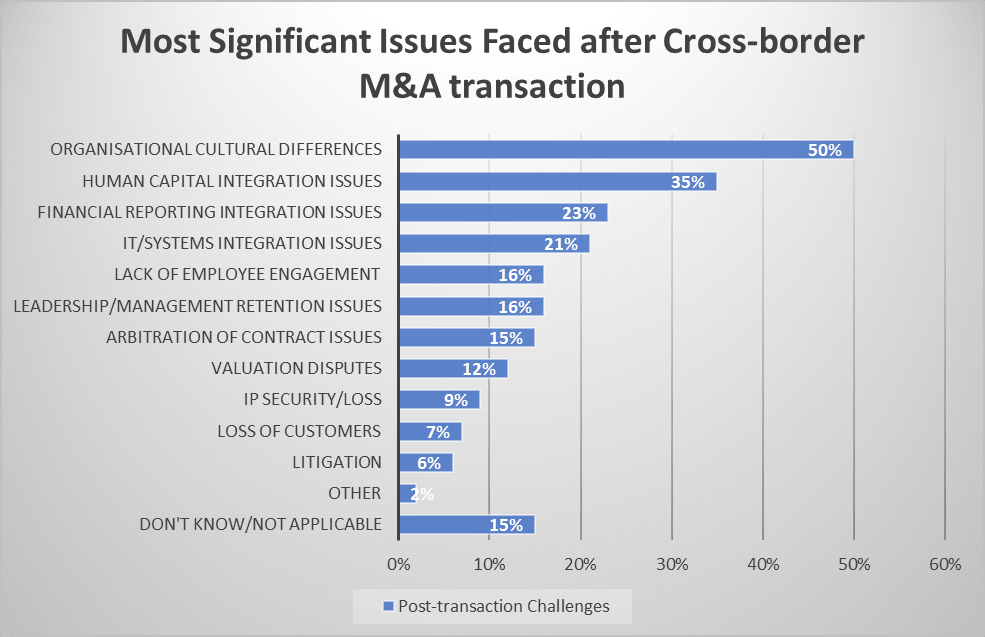
Business Restructuring Challenges Faced by UK Expats in the UAE and How to Overcome Them
- | May 28, 2024

Introduction
Businesses need to respond to change, sometimes quite drastically!
The need for making substantial changes to a business may arise from a host of different factors, ranging from an overwhelming financial challenge to disruptive technology that has altered the entire competition landscape. It may also happen that the organisational structure that worked well for decades no longer fits the changing market dynamics. This is where restructuring comes into play.
Business restructuring involves bringing significant financial or organisational changes to the company. This may include altering debt, operations, or the structure of the organisation. As business restructuring always entails significant changes, the journey can be quite challenging for the companies going through it. More importantly, it requires coordinated efforts of experts across multiple domains. The challenges may look particularly overwhelming for foreign companies undergoing restructuring in the UAE.
In this blog, we will talk about some of these challenges faced by UK expats during business restructuring in the UAE and discuss ways to overcome them.
Types of Business Restructuring
There are multiple ways a business can restructure itself, but these methods can be broadly classified into two categories: financial restructuring and organisational restructuring. Financial restructuring aims to improve the overall financial health of a company. It may include reorganising or refinancing debts, raising new debt, repurchasing stocks, and asset restructuring. On the other hand, organisational restructuring focuses on making the company’s operations more efficient and effective. This could involve Mergers and Acquisitions (M&A), integrating different parts of the business, selling off parts of the company, or even reducing the workforce.
Follow AKW Consultants on WhatsApp Channels for the latest updates.
Business Restructuring Challenges Faced by UK Expats in the UAE
Business restructuring, be it financial or organisational, is a complicated process with several moving parts, each needing to work efficiently and in a coordinated manner for the restructuring to be successful. Here, we have discussed some of the challenges UK expats faced during business restructuring as well as ways to overcome them:
1. Legal Challenge
Federal laws apply across the UAE, but each emirate, such as Dubai or Abu Dhabi, may have separate regulations that an organisation may need to comply with during business restructuring. The free zones offer several benefits for foreign companies, which may have specific regulatory requirements different from those on the mainland. This multi-layered regulatory framework may cause challenges for UK expats going through business restructuring. It is important to note that legally permitted activities depend on the legal form of incorporation of the company as well as the emirate where an organisation is established. Also, due to the complex nature of business restructuring, the process may be governed by various laws. To overcome these legal challenges a team of legal experts who are familiar with the entire process of business restructuring should spearhead the journey.
2. Coordination Challenges
Depending on how a business is restructured, the expectations of numerous stakeholders—including debtors, creditors, employees, suppliers, and customers—often need to be managed. Regarding an acquisition, a CEO, as quoted in the Harvard Business Review, noted that so many people were involved in the negotiations that “it was hard to tell who was doing what, let alone how all their efforts would tie together.” It is also challenging for decision-makers to compare and integrate analyses from different experts. The best solution to avoid the coordination challenge that many UK expats have faced during business restructuring is to use a group of experts who have a set process in place to coordinate individual suggestions into actionable intelligence that can be implemented within stipulated timeframes.
3. Human Resources Challenge
Challenges related to human resources during the business restructuring process mainly come from concerns related to job security and talent retention. Conducting a resistance analysis is essential to put plans in place to deal with the human aspect of restructuring. In the case of M&A, cultural integration is also very important. Two companies might have different work cultures, and it takes time for people to adjust to new things. Transparent communication about restructuring plans and timelines is essential. Restructuring may also result in workforce reduction, which needs to be managed well. UK expats may plan to provide support programmes for employees even after the restructuring is complete.
4. Documentation Challenge
Maintaining accurate and comprehensive documentation is absolutely important during both financial and other organisational restructurings. All activities, decisions, and communications need to be properly recorded for compliance and future audits. For M&A, when two companies merge, they bring different data systems tailored to their specific needs and processes. These systems may use different data standards. If not tackled properly, data loss may occur as well. A detailed documentation process should be maintained right from the very beginning of the restructuring process.
5. Negotiation Challenge
Negotiating the conflicting interests of various stakeholders requires skilled negotiators with clear communication strategies. The most important factor here is researching each of the parties engaged in negotiations in as detailed a manner as possible. A successful negotiation rests on both parties feeling content with the deal considering the leverage each of them had moving into the transaction. UK expats may consider having skilled negotiators in place to overcome this challenge.
Post-Restructuring Challenges: M&A
In the first nine months of 2023, there were 128 M&A transactions in the GCC of which 77 were in the UAE. There are several unique challenges related to business restructuring that companies face once an M&A transaction is complete. UK expats who are planning for restructuring should be familiar with these challenges and plan accordingly.
In cooperation with the Economist Intelligence Unit, Marsh, Mercer, Kroll published “M&A Beyond Borders: Opportunities and Risks,” which surveyed 670 executives from multinationals around the world about cross-border mergers and acquisitions. Among those for whom cross-border M&A was relevant, 64% reported that their last cross-border transaction enhanced shareholder value, 27% identified the effect as neutral, and only 9% said it was negative. The impact of business restructuring lasts long after the process is complete. Here’s what the study found the most significant issues after a cross-border M&A transaction was complete were:

The UAE Legal Framework
As stated earlier, due to the complicated nature of business restructuring, multiple laws might be involved in the process. Articles 275-301 of Title 7 of the Federal Decree-Law No. 32 of 2021 on “Commercial Companies” provide detailed rules and procedures on the “Conversion, Merger, and Acquisition” of companies. For UK expats going through financial restructuring, a very important regulation was passed on May 1, 2024: Federal Decree-Law No. (51) of 2023 “Promulgating the Financial and Bankruptcy Law.” This new law introduces a specialised Bankruptcy Court aimed at handling bankruptcy cases more efficiently. It allows for financial restructuring measures “aimed at helping the debtor keep on performing its business activity and paying off its debts through the application of a preventive settlement or plan,” and therefore, avoid the liquidation of their business and bankruptcy as much as possible. The new law is expected to help smoothen the Financial Restructuring process in the UAE further. Again, under Article 3(2)(b), this law does not apply to companies established in the free zones.
For UK expats, it is also important to note that Article 27 of the Federal Decree-Law No. 47 gives businesses relief during restructuring that involves transferring the whole business or an independent part of it. Often, these kinds of business restructuring can be associated with tax gain or loss. However, under the provisions of this article, companies under the jurisdiction of this law can do so without having any immediate impact on their taxes.
Conclusion
The most important part of the entire Business Restructuring process is the team spearheading it. This team should have expertise in multiple domains such as legal, finance, and human resources, along with established timelines and processes for internal coordination and successful completion of tasks. UK expats who intend to go through business restructuring, either financial or organisational, should have a team that is both skilled and well-coordinated to navigate these complexities effectively.
Find out how AKW Consultants’ team of experts can help you through your business restructuring journey and assist your organisation in putting processes in place to ensure the long-term stability of your company.
Read Also: Why are UK Expats looking to set up a business in the UAE?


